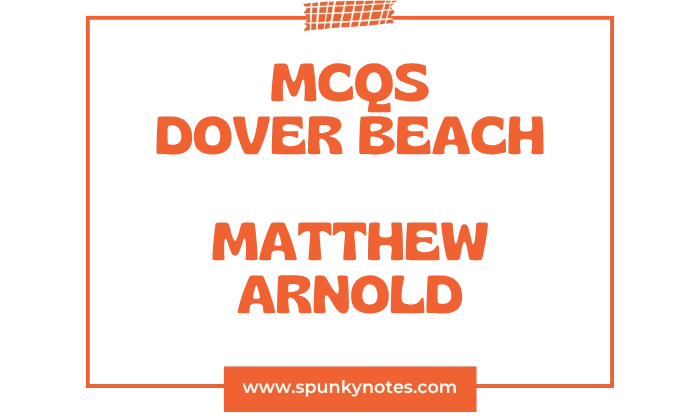

Estimated Reading Time: 8 min
Dover Beach MCQs
1. What is the initial state of the sea described in the opening line?
A. Rough and loud
B. Calm tonight
C. Full of light
D. Retreating rapidly
2. What is visible on the French coast in the first stanza?
A. The naked shingles
B. A bright girdle
C. The light that Gleams and is gone
D. The cliffs of England
3. Where do the cliffs of England stand, according to the first stanza?
A. Upon the Ægean
B. On the darkling plain
C. Out in the tranquil bay
D. Near the vast edges drear
4. What is the quality of the air that the speaker describes when inviting the listener to the window?
A. Confused
B. Sweet
C. Turbid
D. Drear
5. What is the sound that the speaker asks the listener to hear, starting in the first stanza?
A. The breath of the night-wind
B. The confused alarms
C. The grating roar of pebbles
D. The note of peace
6. What happens to the pebbles that cause the roar?
A. They glow with light
B. They are pulled and flung by the waves
C. They stand glimmering and vast
D. They are used to build the strand
7. What is the cadence of the sound described in the second stanza?
A. Rushing cadence fast
B. Tremulous cadence slow
C. Full cadence fair
D. Grating cadence quick
8. What ‘note’ does the sound of the waves bring in?
A. The note of joy
B. The eternal note of sadness
C. The note of struggle
D. The note of certitude
9. Where did Sophocles hear this sound long ago?
A. On the straits
B. On the high strand
C. On the Ægean
D. On the French coast
10. What did the sound bring into Sophocles’ mind?
A. The bright girdle furled
B. The confused alarms
C. The turbid ebb and flow of human misery
D. The naked shingles
11. What metaphorical concept is introduced that was “once, too, at the full”?
A. The Sea of Dreams
B. The Sea of Faith
C. The Sea of Misery
D. The Sea of Light
12. How did the “Sea of Faith” lie around the earth’s shore when it was full?
A. Like the turbid ebb
B. Like the vast edges drear
C. Like the folds of a bright girdle furled
D. Like ignorant armies clashing
13. How is the present roar of the Sea of Faith described?
A. Clear and ringing
B. Melancholy, long, withdrawing
C. Grating and quick
D. Calm and fair
14. To what natural element does the retreating roar of the Sea of Faith yield?
A. The moon’s pull
B. The sun’s setting
C. The breath of the night-wind
D. The thunder of the waves
15. What are the “naked shingles” mentioned in the poem?
A. Pieces of clothing
B. Exposed pebbles
C. Distant stars
D. Foreign armies
16. What is the central plea the speaker makes to their love in the final stanza?
A. Let us fight the armies
B. Let us leave the shore
C. Let us be true to one another
D. Let us find the light
17. The world seems to lie before the speakers like what?
A. A darkling plain
B. A land of dreams
C. A bright girdle
D. A vast edge drear
18. Which essential quality does the world not really possess, according to the final stanza?
A. Variousness
B. Certitude
C. Beauty
D. Newness
19. On what type of plain are the speakers said to be standing?
A. A vast plain
B. A darkling plain
C. A tranquil plain
D. A high plain
20. What action characterizes the “ignorant armies” in the poem’s final line?
A. Retreating to the breath
B. Clashing by night
C. Drawing back the pebbles
D. Lying like a girdle
Brief Overview
Dover Beach is a well-known Victorian poem by Matthew Arnold. It begins with the speaker standing on the coast of Dover, looking out at the calm, moonlit sea. He invites his lover to join him at the window to witness the beautiful scene.
The initial mood of peace quickly shifts to sadness. The speaker focuses on the sound of the waves, which he describes as a “grating roar” that brings in an “eternal note of sadness.” This sound reminds him of human misery throughout history.
The speaker then focuses on the “Sea of Faith.” He recalls a time when religious belief was full and powerful, covering the world like the tide. But he sadly observes that he can now only hear its “melancholy, long, withdrawing roar.”
The speaker feels that the world has lost its faith and is now empty and cheerless. He turns to his lover, saying that since the world offers no certainty, joy, or help for pain, they must rely only on each other.
The poem ends with a famous, despairing image. He states that the world feels like a dark, confusing battlefield. He concludes that they are left alone to struggle in a place where people clash “by night,” ignorant of their true purpose.


